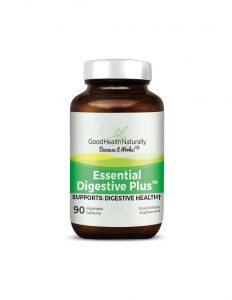Digestion is a complex process which begins the minute we put food into our mouths, and it’s crucial to make sure every stage is working optimally. Otherwise, even if we are eating the best organic produce, we may not be absorbing all the nutrients. Digestive enzymes play a crucial role in this process. They are present in food and produced in our bodies but decline as we age. If we don’t have enough, it can lead to health issues like acid reflux, gas, bloating, nutrient malabsorption and indigestion.
Poor digestion is also associated with a range of conditions, including acne, eczema, allergies, depression, anxiety, and even obesity. It is also worth remembering around 70% of the body’s immune system resides here, so if our gut health is compromised, our immunity will be too. Therefore, could digestive enzymes be the missing link in your quest for optimal health?
Gut Health
The microbiome and digestive health have become hot topics in recent times. The benefits of pre and probiotics are now well established, and many health-conscious people regularly eat fermented food or take a probiotic supplement to support a healthy gut flora. But, it may not be enough. You may also need the power of digestive enzymes to help break down food so the body can absorb nutrients. Together with probiotics and prebiotics, enzymes play a part in the grand orchestra of digestive health.
What Are Digestive Enzymes?
They’re proteins which help break down food into its basic components so that our bodies can absorb the nutrients they need for energy, building cells, tissues, organs, plus other vital functions. They’re made in different parts of the digestive tract, including the mouth, stomach, pancreas and small intestine.
The most important digestive enzymes are:
- Amylase breaks down complex carbohydrates into simple sugars.
- Maltase breaks down a sugar called maltose found in grains and malted foods.
- Lipase breaks down fats into fatty acids and glycerol.
- Protease breaks down proteins into smaller peptides and amino acids.
- Lactase breaks down lactose, a sugar found in milk and dairy products.
- Sucrase breaks down sucrose, a sugar found in table sugar and many other foods.
- Cellulase breaks down cellulose, a complex carbohydrate found in plant cell walls.
- Alpha galactosidase breaks down fermentable carbohydrates.
The interesting thing is each enzyme performs a very specific role and can only break down certain types of molecules. For example, lactase can only break down lactose, the sugar found in milk, while lipase can only break down fats.
Struggling to Digest?
If you notice symptoms such as bloating, wind, discomfort after eating, cramping or any other similar and related digestive symptoms, it could be your body is not able to provide sufficient digestive enzymes for the food you eat.
Our body makes enzymes, and when we’re young, we tend to have an abundant supply. But as we age, we slowly begin to lose this efficiency. By the time we reach 20, the body’s ability to produce natural enzymes will drop by 25% and will continue to decrease by as much as 35% when you reach your 40s.
Fast food and excessive intake of fat and sugars all require large quantities of enzymes to break them down. Some common foods like meat, dairy, and raw veggies can also be tough to digest too. Try modifying your diet to include small quantities of raw, fresh enzyme-rich food such as pineapples, papayas, mangoes, bananas, avocados, and fermented products like kimchi and sour kraut in small, frequent amounts.
Digestive enzyme supplements can help to break down food into its component parts, improving absorption and ensuring the body receives the nutrients it needs to function correctly. They may also help to alleviate symptoms of digestive disorders. For example, lactase supplements can help people with lactose intolerance to digest lactose more easily.
Digestive enzymes can help to reduce inflammation in the gut by breaking down proteins that can trigger an immune response. This can be helpful for people with inflammatory digestive conditions.
The Link Between Stress and Digestion
It’s been dubbed a health epidemic of the 21st century, and stress really is the scourge of modern times. It wreaks havoc on our bodies, and digestion is one of the things which can suffer. When we are stressed, the brain sends signals to the digestive tract via the nervous system, putting it into “fight or flight” mode and suppressing “rest and digest.” If we are constantly stressed day after day, then our bodies may stay in fight or flight mode. This will compromise the way our body digests food. It affects the speed at which it moves through the digestive system, absorption of nutrients, secretion of digestive juices, and may increase the level of inflammation in the digestive system. Relaxation is crucial to calm down all the stress hormones. Some people find digestive support like enzymes and probiotics helpful during extreme periods of stress.
To Conclude
If you feel your digestion needs an extra push, then supplementing with digestive enzymes could be beneficial. They can help ensure your body breaks down food properly to absorb all the necessary nutrients. This can reduce symptoms such as gas, bloating, constipation, or diarrhoea. They usually come in a capsule form, providing a broad spectrum of enzymes for digesting protein, fat, fibre, dairy sugars and carbohydrates. It is important to choose enzymes which are resistant to degradation by hydrochloric acid from the stomach and can reach the small intestine, where digestion takes place.





